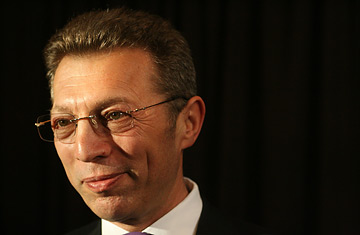
Russian-Israeli billionaire Arkady Gaydamak speaks to the media during a performance by musician Enrique Iglesias at a private party at the Tel Aviv Hilton Hotel December 22, 2006 in Tel Aviv, Israel.
The country's ire is focused on Prime Minister Ehud Olmert, who last week publicly acknowledged that he is "an unpopular Prime Minister" — conceding the truth of opinion polls that give him the lowest approval ratings of any Prime Minister in the nation's history. He bears the onus of the living in the shadow of Ariel Sharon, of failing to snatch victory in last year's Lebanon war — a conflict that saw Hizballah Katyushas raining down on Israeli territory — of leading the nation as the specter of a nuclear-armed Iran rises to the east and of presiding over a government plagued by corruption, financial, ethical and criminal scandals. It is a time of "complete disillusionment, an implosion of faith in the country's leaders," says Michael Oren, author of Six Days of War and a senior fellow at Jerusalem's Shalem Center, an academic research organization.
Olmert has vowed to press on, but contenders for his chair are already positioning themselves for a run at the top spot. Rivals in his own Kadima party include Foreign Minister Tzipi Livni and Housing Minister Meir Sheetrit. A former Prime Minister, Ehud Barak, and a former head of the Shin Bet, Ami Ayalon, who now serves in the Knesset, are angling to take the top spot in the Labor Party from Amir Peretz, Olmert's coalition partner and his disastrous and unpopular choice as defense minister. And at the head of the line is Likud Party chairman Benjamin Netanyahu, another former Prime Minister and an outspoken critic of this government and its readiness to counter the Iranian threat.
Looming over it all, however, is Arkady Gaydamak and his recently established Social Justice organization. Gaydamak is neither a politician nor military man. He is a 54-year-old emigre who started his career running a translation company in France and made his fortune in the wreckage of the Soviet empire. He says Social Justice is not a political party. Rather, it was founded "to form a common ground for the non-privileged minorities who are the majority, for the people who were always kept out of power, who have no access to the new wealth, who have no protection, who are not patronized by the establishment." He styles himself a nagid or gvir, a traditional Jewish philanthropist-leader who uses his wealth for the public good. During the Lebanon War, when the government was slow to shelter hundreds of thousands of Israelis who fled the Katyusha fire in the north, Gaydamak erected a tent city that housed thousands of families. Last fall, when the town Sderot was facing regular Qassam rocket fire from Gaza, Gaydamak paid to bus thousands of residents down south to stay in high-end hotels.
Oren calls him "a product of the moment" who has cannily seized on the leadership vacuum and is "covering all his bases." His natural constituency is the more than one million Russians in Israel, but he's also reaching out to the Arab community and the Israeli mainstream. He throws extravagant parties for the members of Israel's high society and also builds low-income housing for recent immigrants. He bought an Israeli soccer team, Beitar, whose fans are mainly working-class Likud supporters known to chant "death to the Arabs" from the stands. He also owns a basketball team, Hapoel, that is usually cheered on by middle-class centrists, leftists and Arab Israelis. He has also donated money to an Arab soccer team.
Gaydamak also likes to spread his political affiliations around. Though he has said in the past that he would support Netanyahu for the Prime Minister's post, Gaydamak nonetheless promotes talks with the Palestinians sooner rather than later (something Netanyahu does not support) and says Israel should be doing more to improve the quality of life for people in the West Bank and Gaza. While he insists he's not trying to be a kingmaker, he has put himself into a position to do just that. And though he says he has no political ambitions of his own, he adds, "It is not impossible that I'll have to make an uncomfortable decision if I'll see that is my duty to people, but I fervently hope it won't be necessary."
There is, of course, skepticism about his motives, intimation that he is trying to buy popularity. "Not even Moses managed to escape this kind of criticism," he says. Nevertheless, Gaydamak's resume is hardly that of a saint. In 2000, France issued a warrant for Gaydamak's arrest, charging that he had contravened French law by engineering a deal that traded weapons, in exchange for oil, to an Angolan government then fighting a brutal civil war. (A year earlier, he had received a suspended sentence for tax evasion.) Gaydamak fled France to avoid arrest — even though he is a member of the Legion D'Honneur, inducted by President Jacques Chirac most likely in gratitude for Gaydamak's help in securing the release of Frenchmen who'd been taken hostage by Serb paramilitaries in 1995. While in Israel, Gaydamak has been investigated for money laundering. He insists his business practices are clean and that he made the bulk of his money speculating in the Russian stock market.
A controversial past, however, has not prevented Gaydamak from establishing high-level business and political contacts inside Israel and endearing himself to the Israeli public. Where the government stumbled, he acted and now looks like a champion of the people compared to the current leaders. Gaydamak may or may not assume a political role or rank, but, largely thanks to an unpopular prime minister and those around him, he might just determine who gets to run Israel.
